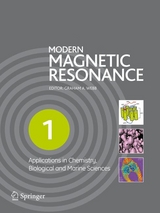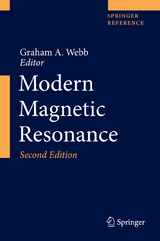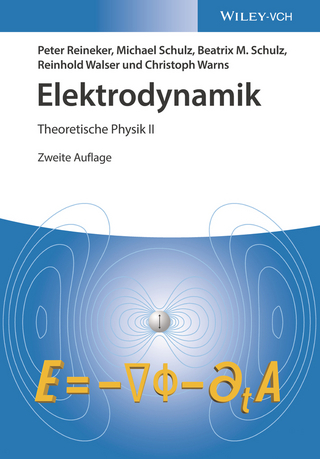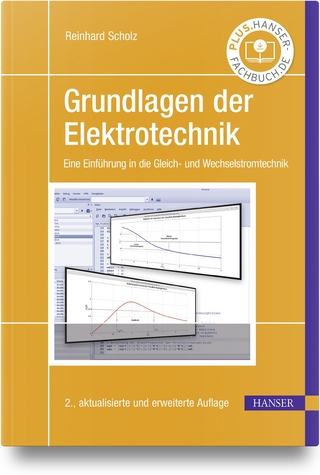Modern Magnetic Resonance
Springer-Verlag New York Inc.
978-1-4020-3894-5 (ISBN)
- Titel erscheint in neuer Auflage
- Artikel merken
A comprehensive collection of the applications of Nuclear Magnetic Resonance (NMR), Magnetic Resonance Imaging (MRI) and Electron-Spin Resonance (ESR).
Covers the wide ranging disciplines in which these techniques are used:
* Chemistry;
* Biological Sciences;
* Pharmaceutical Sciences;
* Medical uses;
* Marine Science;
* Materials Science;
* Food Science.
Illustrates many techniques through the applications described, e.g.:
* High resolution solid and liquid state NMR;
* Low resolution NMR, especially important in food science;
* Solution State NMR, especially important in pharmaceutical sciences;
* Magnetic Resonance Imaging, especially important for medical uses;
* Electron Spin Resonance, especially important for spin-labelling in food, marine and medical studies.
Graham A. Webb has been actively engaged in research involving many aspects of NMR for about 25 years both at University College London and the University of Surrey, where he became a Professor of Physical Chemistry. During this time he has authored more than 400 published primary research papers, given presentations at about 200 international conferences dealing with NMR and supervised about 70 Ph.D. theses. He has been Editor of Annual Reports on NMR since 1975; the latest Volume to appear is number 55. In addition, he has edited The Royal Society of Chemistry Specialist Periodical Reports on NMR since 1978; the latest Volume is number 35. Professor Webb has also organised the biennial international conferences on Applications of NMR in Food Science since 1984.
PART I: APPLICATIONS IN CHEMISTRY, BIOLOGICAL & MARINE SCIENCES
· Amyloids
o Kinetics of Amyloid Fibril Formation of Human Calcitonin.
o Polymorphism of Alzheimer’s A-beta Amyloid Fibrils.
· Chemical Shifts and Spin-Couplings.
o 13C, 15N, 1H, 2H, and 17O NMR Chemical Shift NMR for Hydrogen Bonds.
o NMR Chemical Shift Map.
o NMR Chemical Shifts Based on Band Theory.
o Modeling NMR Chemical Shifts.
o Ab Initio Calculation of NMR Shielding Constants.
o Crystal Structure Refinement Using Chemical Shifts.
o The Theory of Nuclear Spin–Spin Couplings.
· Fibrous Proteins.
o Investigation of Collagen Dynamics by Solid-State NMR Spectroscopy.
o Solid-State NMR Studies of Elastin and Elastin Peptides.
o Structural Analysis of Silk Fibroins using NMR.
· Field Gradient NMR.
o NMR Diffusometry.
o Field Gradient NMR of Liquid Crystals.
o Field Gradient NMR for Polymer Systems with Cavities.
o NMR Measurements Using Field Gradients and Spatial Information.
o Theory and Application of NMR Diffusion Studies.
· Host–Guest Chemistry.
o Solid-State NMR in Host–Guest Chemistry.
· Imaging.
o Mapping of Flow and Acceleration with NMR Microscopy Techniques.
o Industrial Application of In situ NMR Imaging Experiments to Steel-Making Process.
o Biomedical NMR Spectroscopy and Imaging.
o Electron Spin Resonance Imaging in Polymer Research.
o NMR Imaging: Monitoring of Swelling of Environmental Sensitive Hydrogels.
· Inorganic Materials and Catalysis.
o Exploiting 1Hà 29Si Cross-Polarization Features for Structural Characterization of Inorganic Materials.
o Solid State NMR Characterization of Solid Surface of Heterogeneous Catalysts.
· Isotope Labeling.
o Recent Developments in Stable-Isotope-Aided Methods for Protein NMR Spectroscopy.
o Structural Glycobiology by Stable-isotope-assisted NMR Spectroscopy.
· Lipid Bilayer and Bicelle.
o Development and Application of Bicelles for Use in Biological NMR and Other Biophysical Studies.
o Nuclear Magnetic Resonance of Oriented Bilayer Systems.
o Solid-State Deuterium NMR Spectroscopy of Membranes.
o Solid State 19F-NMR Analysis of Oriented Biomembranes.
· Membrane-Associated Peptides.
o Solid-State NMR Studies of the Interactions and Structure of Antimicrobial Peptides in Model Membranes.
o Anisotropic Chemical Shift Perturbation Induced by Ions in Conducting Channels.
o NMR Studies of Ion-Transporting Biological Channels.
· Membrane Proteins.
o Site-Directed NMR Studies on Membrane Proteins.
o Structure of Membrane-Binding Proteins Revealed by Solid-State NMR.
o Solid-State NMR of Membrane-Active Proteins and Peptides.
o Magnetic Resonance Spectroscopic Studies of the Integral Membrane Protein Phospholamban.
o NMR Studies of the Interactions Between Ligands and Membrane-Embedded. Receptors: New Methods for Drug Discovery.
o Photosynthetic Antennae and Reaction Centers.
o Insight into Membrane Protein Structure from High-Resolution NMR.
· New Developments.
o Fast Multidimensional NMR: New Ways to Explore Evolution Space.
o High-Sensitivity NMR Probe Systems.
o CRAMPS.
o Mobile NMR.
o Rheo-NMR.
o Analytical Aspects of Solid-State NMR Spectroscopy.
o 3H NMR and Its Application.
o On-line SEC–NMR.
· NOE and Chemical Exchange.
o The Nuclear Overhauser Effect.
o Solute–Solvent Interactions Examined by the Nuclear Overhauser Effect.
o Chemical Exchange.
· NQR & ESR.
o Separated Detection of H-Transfer Motions in Multi-H-Bonded Systems Studied by Combined 1H NMR and 35Cl NQR Measurements.
o EPR: Principles.
o Zero Field NMR: NMR and NQR in Zero Magnetic Field.
· Organo Metallic Chemistry.
o Organoboron Chemistry.
o Organogermanium Chemistry.
o Organotin Chemistry.
· Paramagnetic Effects.
o 1H and 13C High-Resolution Solid-State NMR of Paramagnetic Compounds Under Very Fast Magic Angle Spinning.
o Paramagnetic Effects of Dioxygen in Solution NMR—Studies of Membrane Immersion Depth, Protein Topology, and Protein Interactions.
· Protein Structure.
o TROSY NMR for Studies of Large Biological Macromolecules in Solution.
o NMR Insight of Structural Stability and Folding of Calcium-Binding Lysozyme.
o NMR Investigation of Calmodulin.
o Analytical Framework for Protein Structure Determination by Solid-State NMR of Aligned Samples.
o Determining Protein 3D Structure by Magic Angle Spinning NMR.
o 19F NMR Study of b-Type Haemoproteins.
· Polymer Structure.
o NMR in Dry or Swollen Temporary or Permanent Networks.
o Crystalline Structure of Ethylene Copolymers and Its Relation to the Comonomer Content.
o Isomorphism in Bacterially Synthesized Biodegradable Copolyesters.
o Two-Dimensional NMR Analysis of Stereoregularity of Polymers.
o Quantitative Analysis of Conformations in Disordered Polymers by Solid-State Multiple-Quantum NMR.
o Polymer Microstructure: The Conformational Connection to NMR.
o Solid-State NMR Characterization of Polymer Interfaces.
o The Structure of Polymer Networks.
o 1H CRAMPS NMR of Polypeptides in the Solid State.
· Polymer Dynamics.
o Dynamics of Amorphous Polymers.
o Molecular Motions of Crystalline Polymers by Solid-State MAS NMR.
o Dynamics in Polypeptides by Solid State 2H NMR.
· Polymer Blends.
o Polymer Blends.
o Configurational Entropy and Polymer Miscibility: New Experimental Insights From Solid-State NMR.
· Quantum Information Processing.
o Quantum Information Processing as Studied by Molecule-Based Pulsed ENDOR Spectroscopy.
· Residual Dipolar Couplings and Nucleic Acids.
o New Applications for Residual Dipolar Couplings: Extending the Range of NMR in Structural Biology.
o Refinement of Nucleic Acid Structures with Residual Dipolar Coupling Restraints in Cartesian Coordinate.
o Conformational Analysis of DNA and RNA.
· Solid-State NMR Technique.
o Analytical and Numerical Tools for Experiment Design in Solid-State NMR Spectroscopy.
o Homonuclear Shift-Correlation Experiment in Solids.
o Two-Dimensional 17O Multiple-Quantum Magic-Angle Spinning NMR of Organic Solids.
o A Family of PISEMA Experiments for Structural Studies of Biological Solids.
· Structural Constraints in Solids.
o Rotational-Echo, Double-Resonance NMR.
o REDOR in Multiple Spin System.
o Torsion Angle Determination by Solid-State NMR.
o Secondary Structure Analysis of Proteins from Angle-Dependent Interactions.
· Telomeric DNA Complexes.
o Comparison of DNA-Binding Activities Between hTRF2 and hTRF1 with hTRF2 Mutants.
o Optimization of MRI Contrast for Pre-Clinical Studies at High Magnetic Field.
o The Application of In Vivo MRI and MRS in Phenomic Studies of Murine Models of Disease.
o Experimental Models of Brain Disease: MRI Contrast Mechanisms for the Assessment of Pathophysiological Status.
o Experimental Models of Brain Disease: MRI Studies.
o Application of MRS in Cancer in Pre-clinical Models.
o Experimental Cardiovascular MR in Small Animals.
o Application of Pharmacological MRI to Preclinical Drug Discovery and Development.
o Application of MRI to Cell Tracking.
· Marine Science
o Comprehensive Compositional Analysis of Fish Feed by Time Domain NMR.
o Low Field NMR Studies of Atlantic Salmon (Salmo salar).
o Water Distribution and Mobility in Fish Products in Relation to Quality.
o Proton NMR of Fish Oils and Lipids.
o Determination of Fatty Acid Composition and Oxidation in Fish Oils by High Resolution Nuclear Magnetic Resonance Spectroscopy.
o Resonance Spectroscopy to Study Lipid Oxidation in Fish and Fish Products.
o Omega-3 Fatty Acid Content of Intact Muscle of Farmed Atlantic Salmon (Salmo salar) Examined by 1H MAS NMR Spectroscopy.
o HR MAS NMR Spectroscopy of Marine Microalgae, Part 1: Classification and Metabolite Composition from HR MAS 1H NMR Spectra and Multivariate Analysis.
o HR MAS NMR Spectroscopy of Marine Microalgae, Part 2: 13C and 13C HR MAS NMR Analysis Used to Study Fatty Acid Composition and Polysaccharide Structure.
o Post-mortem Studies of Fish Using Magnetic Resonance Imaging.
o How is the Fish Meat Affected by Technological Processes?
PART II: APPLICATIONS IN MEDICAL & PHARMACEUTICAL SCIENCES
· Medical Sciences:
o Acquiring Neurospectroscopy in Clinical Practice.
o Application of Magnetic Resonance for the Diagnosis of Infective Brain Lesions.
o Application of 2D Magnetic Resonance Spectroscopy to the Study of Human Biopsies.
o Correlation of Histopathology with Magnetic Resonance Spectroscopy of Human Biopsies.
o Functional MRI.
o High Resolution Magic Angle Spinning (HRMAS) Proton MRS of Surgical Specimens.
o Intraoperative MRI.
o In Vivo Magnetic Resonance Spectroscopy in Breast Cancer.
o In Vivo Molecular MR Imaging: Potential and Limits.
o In vivo 13C MRS.
o Magnetic Resonance Spectroscopy and Spectroscopic Imaging of the Prostate, Breast, and Liver.
o MR-Mammography.
o Phosphorus Magnetic Resonance Spectroscopy on Biopsy and In Vivo.
o Radio Frequency Coils for Magnetic Resonance Spectroscopy.
o Spatially Resolved Two-Dimensional MR Spectroscopy in vivo.
· Overview of NMR in the Pharmaceutical Sciences.
· Instrumentation.
o Applications of Cryogenic NMR Probe Technology for the Identification of Low-Level Impurities in Pharmaceuticals.
o Flow NMR Techniques in the Pharmaceutical Sciences.
o Developments in NMR Hyphenation for Pharmaceutical Industry.
o LC-NMR in Dereplication and Structure Elucidation of Herbal Drugs.
· Techniques.
o New Approaches to NMR Data Acquisition, Assignment and Protein Structure Determination: Potential Impact in Drug Discovery.
o Transferred Cross-Correlated Relaxation: Application to Drug/Target Complexes.
o Novel Uses of Paramagnets to Solve Complex Protein Structures.
o Fast Assignments of 15N-HSQC Spectra of Proteins by Paramagnetic Labeling.
o Phospholipid Bicelle Membrane Systems for Studying Drug Molecules.
o Partial Alignment for Structure Determination of Organic Molecules.
o Measurement of Residual Dipolar Couplings and Applications in Protein NMR.
o Using Chemical Shift Perturbations to Validate and Refine the Docking of Novel IgE Antagonists to the High-Affinity IgE Receptor.
o Dual-Region Hadamard-Encoding to Improve Resolution and Save Time.
o Nonuniform Sampling in Biomolecular NMR.
· Applications.
o Structural Characterization of Antimicrobial Peptides by NMR Spectroscopy.
o Pharmaceutical Applications of Ion Channel Blockers: Use of NMR to Determine the Structure of Scorpion Toxins.
o Structure and Dynamics of Inhibitor and Metal Binding to Metallo-ß-Lactamases.
o NMR Spectroscopy in the Analysis of Protein–Protein Interactions.
o Identification and Characterization of Ternary Complexes Using NMR Spectroscopy.
o The Transferred NOE.
o NMR Kinetic Measurements in DNA Folding and Drug Binding.
o The Use of NMR in the Studies of Highly Flexible States of Proteins: Relation to Protein Function and Stability.
o NMR-based Metabonomics Techniques and Applications.
o Protein Misfolding Disease: Overview of Liquid and Solid-State High Resolution NMR Studies.
o 19F NMR Spectroscopy for Functional and Binding High-Throughput Screening.
o Applications of Receptor-Based NMR Screening in Drug Discovery.
o NMR SHAPES Screening.
o NMR-Based Screening Applied to Drug Discovery Targets.
o NMR and Structural Genomics in the Pharmaceutical Sciences.
PART III: APPLICATIONS IN MATERIALS SCIENCE & FOOD SCIENCE
· Materials Science
o Acoustically Stimulated NMR Relaxometry: Application to the Study of Molecular Dynamics in Liquid Crystalline Materials.
o Characterization of Elastomers Based on Monitoring Ultraslow Dipolar Correlations by NMR.
o Correlating Molecular and Macroscopic Properties of Elastomers by NMR Relaxometry and Multi-pulse NMR Techniques.
o Determining Structural and Dynamic Distribution Functions from Inhomogeneously Broadened NMR Spectra: The Conjugate Orthogonal Functions Approach.
o Fluid Diffusion in Partially Filled Nanoscopic and Microscopic Porous Materials.
o Gas Adsorption on Carbon Nanotubes.
o Magnetic Resonance Studies of the Heterogeneous Rotational and Translational dynamics in Disordered Materials.
o Nuclear Magnetic Resonance in Ferromagnetic Multilayers and Nanocomposites: Investigations of Their Structural and Magnetic Properties.
o 1H Solid-State NMR of Supramolecular Systems.
o Quadrupolar NMR of Inorganic Materials: The Multiple-Quantum Magic Angle Spinning Experiment.
o Rheo-NMR Spectroscopy.
o Advances in Single-Sided NMR.
o Site-specific Characterization of Structure and Dynamics of Complex Materials by EPR Spin Probes.
o NMR of Organic Semiconductors.
o Solid State NMR of Xerogels.
o Solid-State 17O NMR Spectroscopy of High-Pressure Silicates.
o The Structure of Oxide Glasses: Insights from 17O NMR.
o Studies of the Local Structure of Silk Using Solid-State NMR.
o Velocity Imaging of Granular Materials.
· Food Science
· High Resolution Solution State Methods.
o Characterization of the Chemical Composition of Beverages by NMR Spectroscopy.
o High Resolution NMR of Carrageenans.
o Flavor–Food Compound Interactions by NMR Spectroscopy.
o High-Resolution Nuclear Magnetic Resonance Spectroscopy of Fruit Juices.
o High-Resolution NMR Spectroscopy in Human Metabolism and Metabonomics.
o High-Resolution NMR of Milk and Milk Proteins.
o High-Resolution 13C Nuclear Magnetic Resonance in the Study of Oils.
o High-Resolution 1H Nuclear Magnetic Resonance in the Study of Oils.
o SNIF-NMR—Part 1: Principles.
o SNIF-NMR—Part 2: Isotope Ratios as Tracers of Chemical and Biochemical Mechanistic Pathways.
o SNIF-NMR—Part 3: From Mechanistic Affiliation to Origin Inference.
o SNIF-NMR—Part 4: Applications in an Economic Context: The Example of Wines, Spirits, and Juices.
o High-Resolution Nuclear Magnetic Resonance Spectroscopy of Wine, Beer, and Spirits.
· Relaxation Time Methods.
o NMR Relaxation of Dairy Products.
o Characterization of Molecular Mobility in Carbohydrate Food Systems by NMR.
o Diffusion and Relaxation in Gels.
o NMR Relaxation and Diffusion Studies of Horticultural Products.
o Proton NMR Relaxometry in Meat Science.
o Time-Domain NMR in Quality Control: More Advanced Methods.
o Time-Domain NMR in Quality Control: Standard Applications in Food.
o Nuclear Magnetic Relaxation in Starch Systems.
· High Resolution Solid State Methods.
o Magic Angle Spinning NMR of Flours and Doughs.
o High-Resolution Magic Angle Spinning NMR Spectroscopy of Fruits and Vegetables.
o High-Resolution Solid-State NMR of Gluten and Dough.
o High-Resolution Solid-State NMR as an Analytical Tool to Study Plant Seeds. High-Resolution Solid-State NMR Spectroscopy of Starch Polysaccharides.
· Imaging and Related Techniques.
o NMR Imaging of Bread and Biscuit.
o NMR Imaging of Dairy Products.
o NMR Imaging of Dough.
o MRI in Food Process Engineering.
o Rheo-NMR: Applications to Food.
o Temperature Measurements by Magnetic Resonance.
· Statistical Methods.
o Chemometric Analysis of NMR Data.
o Direct Exponential Curve Resolution by SLICING.
· ESR Methods.
o ESR as a Technique for Food Irradiation Detection.
o ESR Spectroscopy for the Study of Oxidative Processes in Food and Beverages.
· Applications to Food Systems.
o Magnetic Resonance Studies of Food Freezing.
o Nuclear Magnetic Resonance Studies on the Glass Transition and Crystallization in Low Moisture Sugars.
o Probing the Sensory Properties of Food Materials with Nuclear Magnetic Resonance Spectroscopy and Imaging.
o Single-Sided NMR in Foods.
o Applications of NMR in the Studies of Starch Systems.
| Erscheint lt. Verlag | 20.5.2008 |
|---|---|
| Zusatzinfo | 118 Tables, black and white; CCXL, 1926 p. In 3 volumes, not available separately. |
| Verlagsort | New York, NY |
| Sprache | englisch |
| Maße | 193 x 260 mm |
| Gewicht | 5123 g |
| Themenwelt | Naturwissenschaften ► Physik / Astronomie ► Elektrodynamik |
| Technik ► Maschinenbau | |
| ISBN-10 | 1-4020-3894-1 / 1402038941 |
| ISBN-13 | 978-1-4020-3894-5 / 9781402038945 |
| Zustand | Neuware |
| Haben Sie eine Frage zum Produkt? |
aus dem Bereich





